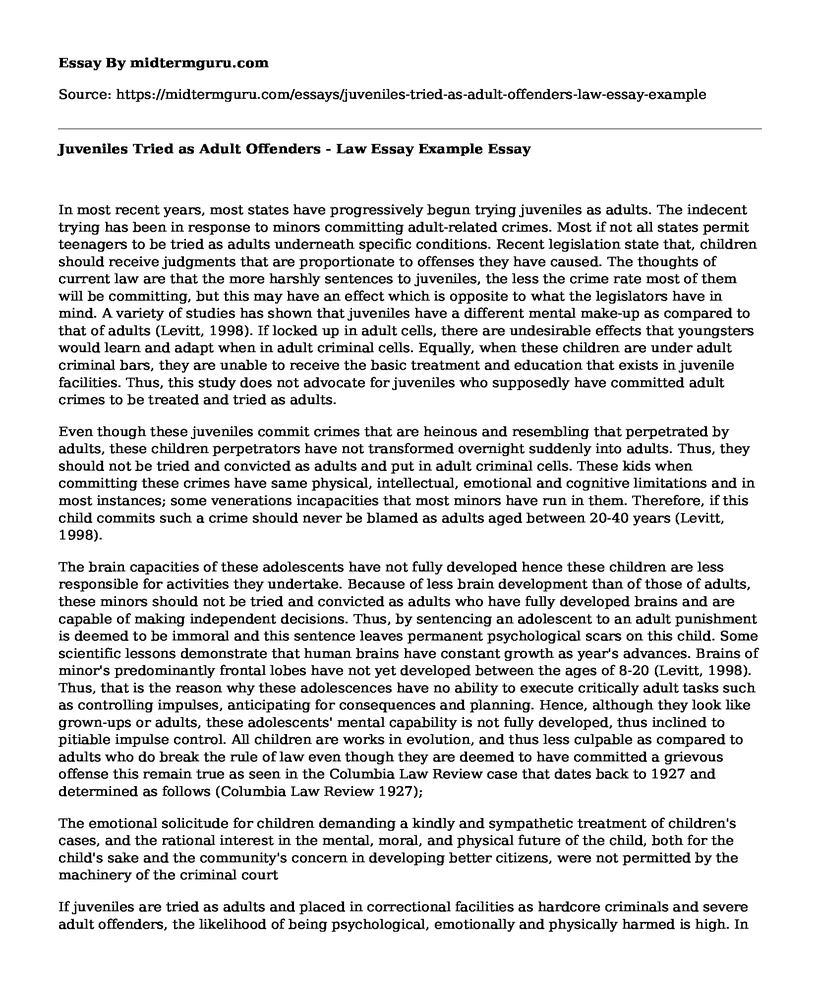In most recent years, most states have progressively begun trying juveniles as adults. The indecent trying has been in response to minors committing adult-related crimes. Most if not all states permit teenagers to be tried as adults underneath specific conditions. Recent legislation state that, children should receive judgments that are proportionate to offenses they have caused. The thoughts of current law are that the more harshly sentences to juveniles, the less the crime rate most of them will be committing, but this may have an effect which is opposite to what the legislators have in mind. A variety of studies has shown that juveniles have a different mental make-up as compared to that of adults (Levitt, 1998). If locked up in adult cells, there are undesirable effects that youngsters would learn and adapt when in adult criminal cells. Equally, when these children are under adult criminal bars, they are unable to receive the basic treatment and education that exists in juvenile facilities. Thus, this study does not advocate for juveniles who supposedly have committed adult crimes to be treated and tried as adults.
Even though these juveniles commit crimes that are heinous and resembling that perpetrated by adults, these children perpetrators have not transformed overnight suddenly into adults. Thus, they should not be tried and convicted as adults and put in adult criminal cells. These kids when committing these crimes have same physical, intellectual, emotional and cognitive limitations and in most instances; some venerations incapacities that most minors have run in them. Therefore, if this child commits such a crime should never be blamed as adults aged between 20-40 years (Levitt, 1998).
The brain capacities of these adolescents have not fully developed hence these children are less responsible for activities they undertake. Because of less brain development than of those of adults, these minors should not be tried and convicted as adults who have fully developed brains and are capable of making independent decisions. Thus, by sentencing an adolescent to an adult punishment is deemed to be immoral and this sentence leaves permanent psychological scars on this child. Some scientific lessons demonstrate that human brains have constant growth as year's advances. Brains of minor's predominantly frontal lobes have not yet developed between the ages of 8-20 (Levitt, 1998). Thus, that is the reason why these adolescences have no ability to execute critically adult tasks such as controlling impulses, anticipating for consequences and planning. Hence, although they look like grown-ups or adults, these adolescents' mental capability is not fully developed, thus inclined to pitiable impulse control. All children are works in evolution, and thus less culpable as compared to adults who do break the rule of law even though they are deemed to have committed a grievous offense this remain true as seen in the Columbia Law Review case that dates back to 1927 and determined as follows (Columbia Law Review 1927);
The emotional solicitude for children demanding a kindly and sympathetic treatment of children's cases, and the rational interest in the mental, moral, and physical future of the child, both for the child's sake and the community's concern in developing better citizens, were not permitted by the machinery of the criminal court
If juveniles are tried as adults and placed in correctional facilities as hardcore criminals and severe adult offenders, the likelihood of being psychological, emotionally and physically harmed is high. In other instances, these juveniles will be subjected to high pressure and stress from other inmates. If this kind of abuse done to these children is not detected and curbed earlier, it may often lead to harsh psychological impairment or suicide. Thus, adolescents if by any chance are sentenced to adult crimes and sent to adult facilities, the child's future implication is considered as the following:
Changes in adult punishments, even though they do not affect juveniles directly, may modify the future expected returns to crime and thereby influence the current investment decisions of juveniles. Finally, punishment itself may affect the returns to crime versus legitimate activities, leading to long-run changes in criminal involvement. For instance, if juvenile detention center facilitates the acquisition of illegal human capital or stigmatizes those in custody, the harsh punishment of juveniles may reduce crime in the short run but increase it over a longer time horizon (Levitt, 1998).
References
Levitt, S. D. (January 01, 1998). Articles - Juvenile Crime and Punishment. The Journal of Political Economy, 106, 6, 1156.
Rights of Juveniles to Constitutional Guarantees in Delinquency Proceedings. (December 01, 1927). Columbia Law Review, 27, 8, 968-974.
Cite this page
Juveniles Tried as Adult Offenders - Law Essay Example. (2021, Jun 17). Retrieved from https://midtermguru.com/essays/juveniles-tried-as-adult-offenders-law-essay-example
If you are the original author of this essay and no longer wish to have it published on the midtermguru.com website, please click below to request its removal:
- Annotated Bibliography: Police Brutality
- Paper Example on Uniform Crime Report
- Paper Example on Killing: An Ethical Perspective
- The Unlicensed Reproduction of Copyrighted Media - Paper Example
- Essay Sample on Business Management: Law and Strategy Concept
- Paper Example on Protecting the Youth From Challenges of Stop and Search Policies
- Case Study on Duane Edward Buck v. Lorie Davis







